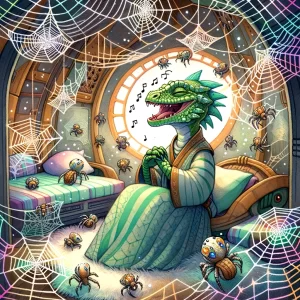by Mary E. Lowd
Originally published in New Myths, September 2017

S’lisha traced her scaly claw over the transparent metal surface of the incubator. It was the most complex cargo crate that she’d ever seen — heating and cooling coils all around the sides, a humidifier built into the base, and brackets inside to hold all of the eggs carefully in place. It had come with detailed instructions for all the settings — cool at first, but warmer and moister over time.
The eggs inside were translucent, oval, and all lined up in rows. S’lisha could make out the dancing shadows of fetal creatures, angular and leggy, moving inside their membranous shells. S’lisha found their movements mesmerizing and had taken a moment to stop and watch them every day since the crate had arrived onboard.
She could swear that today the baby arachnids — or whatever they were — moved more slowly. She tapped her claws against the side of the crate, hoping to rouse them.
“Don’t fiddle with that!” Greecha shouted. She glided across the cargo bay on her mechanical treads. “If the settings on this crate vary at all from the specifications, our buyer doesn’t have to pay.” Greecha was a robo-lifeform. She followed and enforced rules exactly as written, making her an extraordinarily reliable employee, but also an inflexible one.
S’lisha tried reasoning with Greecha anyway: “They’re dying.”
“Not our problem.”
Predictable. S’lisha snorted.
As soon as Greecha left the cargo bay, S’lisha experimented with the temperature and moisture settings on the incubator until the fetal shadows began moving again as they had before. Lively, lithe shadows. The sight of their dancing made the tip of S’lisha’s spiked tail curl with pleasure.
But she couldn’t allow Greecha to discover what she’d done. So S’lisha checked the corridor, saw it was clear, and surreptitiously wheeled the incubator to her own quarters. Once the incubator was safely hidden under her bed, S’lisha locked her quarters and made her way to the bridge. Cargo-workers didn’t usually visit the bridge, so the captain — a human female — wasn’t pleased to see the reptilian alien.
“What do you want?” Captain Corridan frowned her pink primate lips.
“There’s some rotting cargo stinking up the cargo bay,” S’lisha said, lying with her forked tongue. “Whaddaya want me to do with it?”
Captain Corridan’s hands were full with data-pads of star maps. She didn’t even look at S’lisha as she said, “Deal with it. That’s your job.”
“Space it?” S’lisha asked.
One of the pilots, another human, came over to the captain to confer about possible course adjustments. The captain was too busy to remember a cargo-worker asking to be micro-managed. That was fine by S’lisha. She had what she needed.
* * *
Next shift, Greecha accused S’lisha of messing with the incubator, and S’lisha said matter-of-factly, “It was rotting. Captain said to space it.”
Greecha grumbled, the gears in her voice box grinding, but she couldn’t countermand the captain. “You could have emptied and cleaned it.”
S’lisha shuddered, the scales along her back rippling at the idea of cleaning out an incubator filled with rotten eggs. “No thanks,” she hissed.
Greecha’s mechanical eyes telescoped outward to stare at S’lisha pointedly. “If we get charged for it, it’s coming out of your paycheck.”
S’lisha wasn’t worried. She’d probably get a medal for saving the baby arachnids when they arrived at their destination still alive due exclusively to S’lisha’s heroics. Maybe Greecha would be punished by being torn apart and sold as scrap metal.
In the mean time, Greecha punished S’lisha by making her rearrange the heaviest cargo — for safety reasons, of course — and then changing her mind and making S’lisha put it all back. As if Greecha was actually changing her mind. With that mechanical brain, she had the optimal safety pattern mapped out for any configuration of cargo instantly. S’lisha hated robots.
By the end of her shift, S’lisha stumbled into her quarters, ready to hibernate for a hundred years. Or else murder a hundred stupid robots.
She was greeted by the sight of gossamer rainbows on shining lines of silken thread, widely spaced throughout most of the room but densely woven around her bed where the incubator was hidden.
S’lisha navigated the room, nimbly careful to avoid the lines of silk. She didn’t want to break them. At the edge of her bed she crouched, statue still, until the tiny arachnids dared to show themselves. Their faceted eyes glittered like diamonds; their tiny carapaces shone like mother-of-pearl; and their delicate legs pulled at the strands of silk, as if they were still deciding what to do — whether to explore the reptilian biped that had entered their realm or hide from her in fear.
S’lisha sang to the arachnids in the guttural, bellowing tones of her native language — a sound that the humans onboard had compared to a giant frog dying. The baby arachnids, however, seemed to like it and swung on gossamer threads to her. They landed lightly on her scaled shoulders and head spikes. With busy legs, they wove a shawl of silk that settled over S’lisha like the peace she’d known as a mere hatchling in the hibernation caves on her homeworld.
For weeks, S’lisha sang to the baby arachnids at night and slept under their soft silk, saddened when she had to leave them in the morning for her shifts. She cared for them, feeding them from her own rations until the ship docked at a waystation, and she was able to surreptitiously buy a supply of feeder flies from an avian merchant.
The baby arachnids greeted S’lisha at the end of her shifts by swinging eagerly across the room to rest on her arms and shoulders. They danced when she sang, tickling the soft spaces between her scales with their tiny feet. They skittered around the room, playing and chasing each other, wrestling until S’lisha laughed at their antics.
Humans had compared S’lisha’s laugh to a komodo dragon hiccupping. That was fine. She didn’t care what the humans thought, and besides, they rarely gave her anything worth laughing at.
The arachnids, however, laughed with her, delighted by the sound of her laughter. At least, that’s what S’lisha thought it meant when they clapped their little feet together.
They made her so happy.
* * *
On the day that the incubator’s buyer was scheduled to come for his shipment, S’lisha prowled nervously through the cargo bay. She skulked past the crates of his cargo, wishing her scales were chromataphylic like some members of her species. Then she could disappear, camouflaged, while she waited for him, rather than ducking guiltily away every time Greecha glared at her with those telescopic eyes.
When the cargo bay door lifted, a mammalian alien with broad, hunched, furry shoulders lumbered in. He was a Torofor — not at all what S’lisha had expected. Fuzzy mammaloids rarely kept insectoids of any type as pets, let alone arachnids. The mammaloid fear of leggy exoskeletons was strangely universal.
Greecha wheeled her way across the cargo bay to meet the Torofor, and then led him toward his pile of crates. As he passed a pair of human cargo workers, one of them whispered to the other, “That’s one big bear,” reducing yet another sentient species to a shadow of some pre-sentient animal from the human’s homeworld.
The Torofor examined the pile of crates before huffing an accusation: “I don’t see the incubator. It’s delicate. How dare you have crushed it under all these hardier crates!”
The lenses in Greecha’s telescope eyes flashed red as she said, “One of our cargo workers threw that one out. Apparently, it was rotting.”
S’lisha was about to step forward, defend her honor, and declaim the safety of the Torofor’s precious arachnids to him, when he growled, “They’re supposed to rot. That’s the whole point of the incubator — fermented Salisal eggs are a delicacy.”
In honesty, S’lisha couldn’t feel horrified. Fermented arachnid eggs did sound delicious. She certainly ate her fair share of insects.
However, she also didn’t feel the need to tell an angry Torofor what had really happened to his expensive delicacy.
Let Greecha dock her pay.
S’lisha slipped silently out of the cargo bay and returned to her quarters, where she was greeted by silken rainbows, sparkly multi-faceted eyes, and the embrace of many tiny feet.
 Read more stories from Brunch at the All Alien Cafe:
Read more stories from Brunch at the All Alien Cafe:
[Previous] [Next]

tHAT WAS DELIGHTFUL. i DON’T LIKE ARACHNIDS MUCH MYSELF, THEY MOVE TOO QUICKLY, SCUTTLE That was delightful, and I must admit spiders don’t normally do it for me, but your descriptions were so charming that I found them very attractive. My main problem is the way that they move; they scuttle.
I didn’t see the end coming though, and I wouldn’t mind mother of pearl carapaces and rainbow silk!
Thank you, oh and the character S’lisha sounds like an interesting character in a setting that gives scope for loads of stories.
Thank you! I also struggle with arachnids, but I liked the idea of a different species of person being charmed by them the way we’re charmed by cats and dogs. And yes, there are definitely more S’lisha stories! The first one she appeared in was “Hidden Feelings”:
http://deepskyanchor.com/hidden-feelings/
And the next one about her, “Hidden Intentions,” originally got published in Analog, which was really cool:
http://deepskyanchor.com/hidden-intentions/
Sorry, I didn’t edit the first line.